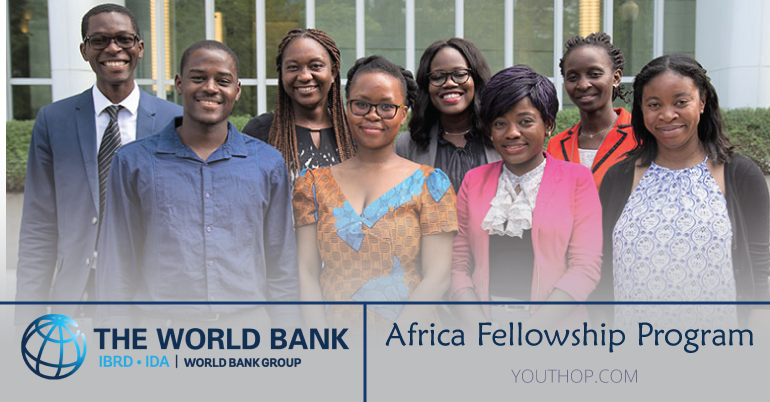WORLD BANK GROUP AFRICA FELLOWSHIP PROGRAM
About the WBG Africa Fellowship Program:
The initiative targets talented African nationals who are completing or have recently finished their Ph.D. in a field relevant to the World Bank’s work. Since its inception, the fellowship program has been highly successful, fostering a strong pipeline of young African talent interested in pursuing careers in development, within international institutions, African governments, think tanks, and academia.
Selected fellows are offered a six-month assignment at WBG offices either in Washington D.C. or in country offices to gain practical experience in WBG operations. This involves knowledge generation and dissemination, policy design at both global and country levels, and the establishment of institutions to foster inclusive growth in developing nations. While engaging in research and innovation across various sectors, fellows also contribute to research, economic policy, technical assistance, and lending operations aimed at achieving the World Bank’s objectives of poverty elimination and shared prosperity.
Eligibility Criteria:
– Recent Ph.D. graduates (within three years of completion) or enrolled in the final year of a Ph.D. program.
– Proficient in English, with strong written and verbal communication skills.
– Possess strong quantitative and analytical abilities.
– Below the age of 32 by the application deadline.
Selection Process:
Phase I involves shortlisting candidates for potential hiring by various units of the WBG based on their specialization. Applicants are informed of the status of their applications and whether they have been shortlisted.
Phase II entails the final selection of fellows in consultation with different units of the WBG. Shortlisted candidates are notified of their selection status, and upon acceptance, they are hired as short-term consultants for a six-month period starting January 2024.
Fellows are entitled to consultant fees and round-trip economy class air travel to Washington, D.C., or a WBG country office from their university or institution.
Source: Institute for Africa Student

